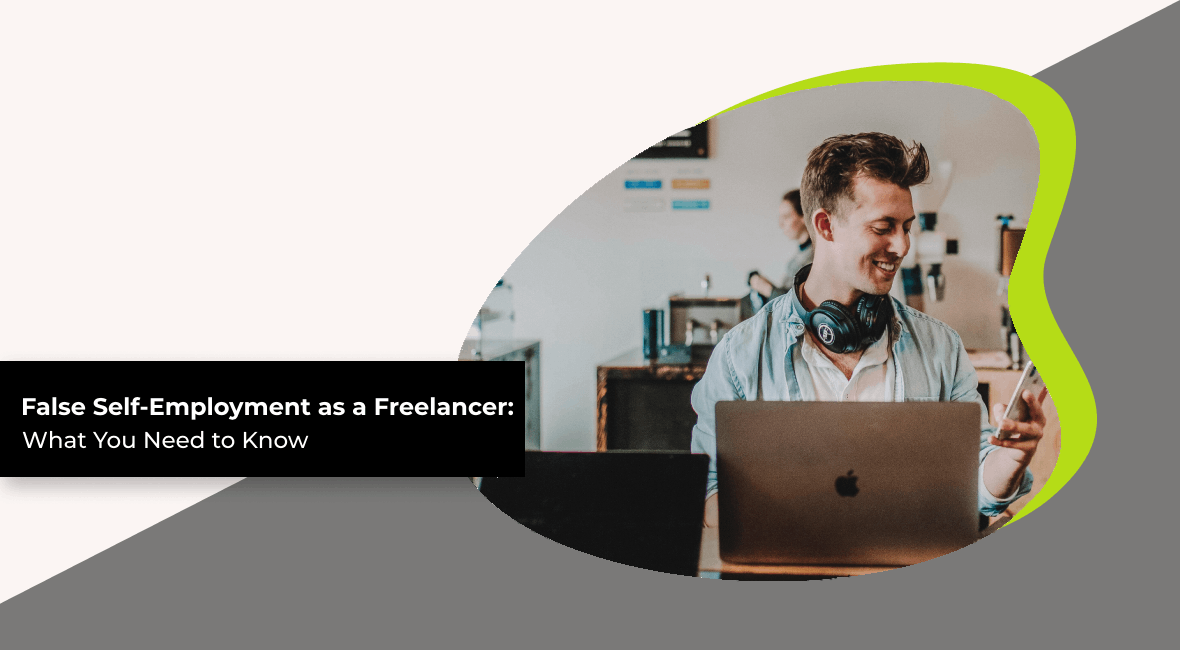False Self-Employment as a Freelancer: What You Need to Know

The topic of false self-employment often causes concern and uncertainty among freelancers. But it is not that complicated. If you keep a few things in mind, you'll stay on the safe side and make sure that neither you nor your clients get into legal trouble.
What is false self-employment?
False self-employment (in German: Scheinselbstständigkeit) means that a freelancer is self-employed but works almost exclusively for one client and is treated like an employee by the client. As a result, They don’t meet the characteristics of self-employment, such as entrepreneurial risk and flexibility. The freelancer does not benefit from the advantages of a permanent position and receives no protection against dismissal, no paid vacation and no continued remuneration in case of illness. The employer also does not pay social security contributions for them.
Why is this a problem? This practice is not in line with the principles of the welfare state and is prosecuted in a similar way to undeclared work. The German pension insurance, the tax office or the health insurance can carry out checks to detect false self-employment. If it is detected, the employer must pay social security contributions in arrears and there is a complicated reversal of the VAT paid. In addition, both sides must pay back wage tax. In the case of intentional behavior on the part of the client, this can even be assessed as a criminal offense and a fine or even imprisonment may be imposed.
Possible consequences of false self-employment for freelancers
For freelancers, the consequences of false self-employment are less severe, but still unpleasant. In such a case, the freelancer can sue for the status of an employee. However, it is questionable whether they want to do so at all, since they have deliberately chosen to be self-employed. In addition, there are the following reasons for avoiding false self-employment as a freelancer:
- Tedious and unpleasant process
- Customer relationship may be destroyed
- Reversal of sales tax
- Wage tax back payment
Recognizing false self-employment
There is no universal list of criteria for false self-employment, as each case is considered individually. However, if you are economically dependent on a client, work for them according to their instructions, are involved in internal processes there and don’t act as an entrepreneur yourself, these factors speak quite strongly for false self-employment.
The following factors can indicate false self-employment, but it depends on the overall picture and not all points have to apply to you:
- You are given guidelines on your working hours, have to sign off when you are sick and coordinate vacation.
- You work long-term on the client's premises and use their equipment.
- You receive instructions that go beyond the usual coordination.
- You have similar tasks as salaried employees and are part of a permanent team.
- You generate a large part of your turnover through the client and are hired by them for an indefinite period.
- You are not allowed to accept any other clients, or you have to ask the client for permission first.
- You do not have your own website and do not bear any entrepreneurial risk with your self-employment.
- You receive a fixed monthly salary.
- You are present at internal company meetings or events that have nothing to do with your tasks.
- You have a company email address or company business cards, with no indication of your external status.
It is also important to know that it is possible to be false self-employed with different clients at the same time, just as it is also possible to have two part-time jobs as an employee. So you are not automatically on the safe side if you have more than one client. The decisive factor is how you work in each case.
Our false self-employment test gives you a good assessment of whether you could be false self-employed. You answer a few questions and receive the result.
If you want more legal certainty when working with your clients, take a look at our platform 9am. There you can get free contract templates and much more.
Avoiding false self-employment as a freelancer
If you want to avoid false self-employment, you should make sure that you can work in a self-determined way and that you are not too involved in the processes of your clients. To minimize the risk of false self-employment, you can:
- Have several clients: Make sure that you do not work permanently for only one client. But even if you have several clients, you should pay attention to the other criteria.
- Use your own premises and equipment: Work mainly in your own office at home, an external office or a coworking space and use your own equipment.
- Avoid integration into internal processes: Plan and organize your work independently, don't attend meetings that have nothing to do with your work, and arrange your working hours according to your needs.
- Act as an entrepreneur: Show that you bear an entrepreneurial risk and want to attract other clients by, for example, having your own website or profile on professional networks and by conducting your own marketing activities.
FAQs
What are the consequences of false self-employment for freelancers?
The consequences for freelancers are less severe than those for clients, but you should still avoid false self-employment. Together with the client, you will have to pay the unpaid wage tax, there will be a reversal of the sales tax, and you may be able to sue for a permanent position in the company.
Can I avoid false self-employment by founding a GmbH?
Only natural persons can be false self-employed. That is why people sometimes try to set up a GmbH (limited liability company) so that this cannot happen. However, if this only serves to disguise the false self-employment, the same consequences apply as without a GmbH.
Can small entrepreneurs be false self-employed?
The status as a small entrepreneur (in German: Kleinunternehmer) does not make any difference in the assessment. It is even possible that the risk of false self-employment is higher for this group, because they often make less turnover and therefore work for fewer clients.
Learn more about Scheinselbstständigkeit...


